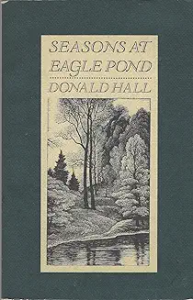Seasons at Eagle Pond by Donald Hall 1987
I loved this book for so many reasons.
First of all, it’s a beautiful physical object. Enclosed in a box, the plain green and red cover holds thick paperstock typeset in Linotype Waverly, a face based on designs of a 19th C. German typefounder. The book is richly illustrated with prints by Thomas Nason from the collection of the Boston Public Library. Finally, the book was printed and bound by a Vermont company, The Book Press of Brattleboro. Taken all together, reading this book was a lovely physical and asethetic experience.
Second, Donald Hall is, perhaps, my favorite writer. A poet, essayist, children’s book author, short story writer, memoirist, Red Sox fan, rural New Hampshire resident, editor of poetry anthologies, literary critic, and my pen pal for over 50 years after we met in Ann Arbor, he a professor of English and I a third year medical student. Over the years, we exchanged dozens of letters about poetry, writing, the weather, the Red Sox, and life. I was deeply saddened when he died at 90 in 2018. I lost a friend and literature lost future contributions from this former U.S. Poet Laureate.
Third, I love the story of how Hall and his second wife, the poet Jane Kenyon, met in Ann Arbor and decamped to his family farm in Wilmot, NH in 1975 exchanging the academic life for one of rural quiet and independent writing. The farm had been bought by his great-grandfather, Ben Kenniston in 1865 on the southern face of Ragged Mountain and looking at Kearsarge to the south. Hall’s grandmother, Kate had been born there in 1878 and along with his grandfather, Wesley Wells raised four daughters including Hall’s mother, Kate. Hall was born and raised in Hamden, CT where his father ran a dairy, but he spent all of his summers with his grandparents on the farm in NH, caring for the chickens, haying, and spending quiet afternoons by the pond and quiet evenings with his grandparents. Hall and Kenyon lived on the farm at Eagle Pond for over twenty years, bearing Kenyon’s struggle with leukemia that ended with her death in 1996 and Hall’s final years alone, writing two books about his wife’s death and three books of essays about aging.
Finally, ‘Seasons at Eagle Pond’ is a wonderful example of Hall’s prose, and well worth the re-reading I just did. In language that reflects his poet’s sensitivity and ear, he describes the farm, woods, pastures, stone walls, and pond as they move from winter through spring, summer, and fall. Time and time again, I marveled at his ability to capture feelings and experiences I have had living part time in rural Vermont—the farmer’s work from lambing to putting up ten cords of firewood each winter followed by maple syrup making; the parades featuring volunteer fire departments and church bean suppers marking the Fourth of July and Old Home Day; the house-shaking plowing of Route 4 in the night; the black flies that make gardening in the spring so challenging; and on and on as he brings his NH homestead to life.
I have nearly all of Hall’s books filling a shelf in Cambridge and one in Vermont. His ‘Ox Cart Man’ and ‘The Man Who Lived Alone’ are books I’ve read to my daughters and more recently my grandchildren over and over. His poetry book ‘Kicking the Leaves’ is a perennial favorite, and I loved his final essay collections ‘Essays after Eighty’ and ‘A Carnival of Losses: Notes Nearing Ninety’.
Time passes in Hall’s work as it did in his life. Gone now nearly 8 years, I believe that he will be one of those writers who is read, taught, analyzed, and enjoyed far into the future. ‘Seasons at Eagle Pond’ will be an important part of that legacy.



